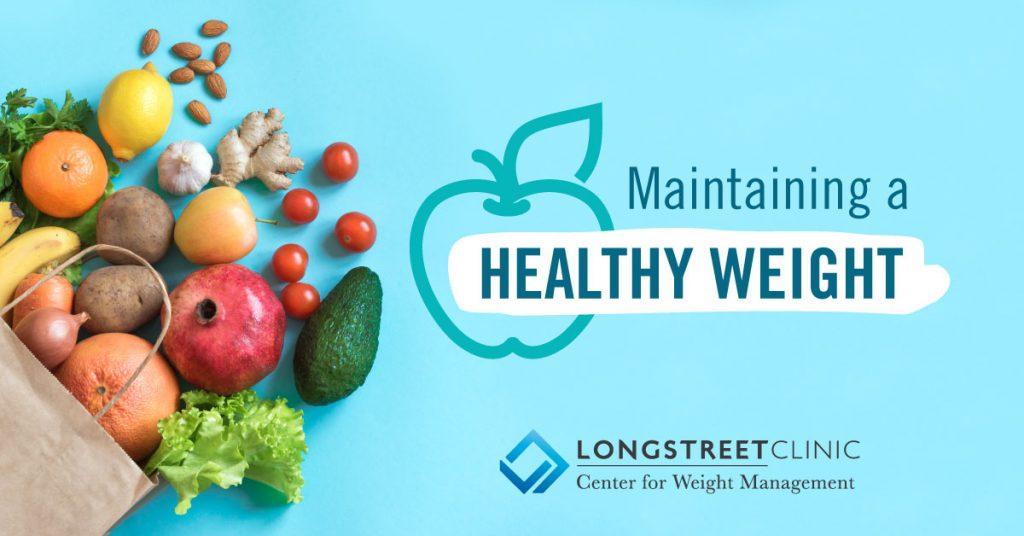Every day, doctors and scientists learn more about the novel coronavirus and the sickness it can yield – COVID-19.
Studying something so tiny yet so intricate as a virus requires time, and that is why is experts are still discovering new aspects of the novel coronavirus just months removed from the start of the pandemic.
However, there are some concrete facts that we do know, and many of these are related to how ANY virus affects your body, so we can trust these aspects will not change – no matter the information that may eventually avail itself.
One of those facts concerns your body weight and nutrition. In short, if you are battling weight issues, you may be putting yourself not only in a worse condition to battle infection, but also putting yourself at risk of many other health concerns.

That is why Longstreet Clinic care providers like Oteia K. Morris, FNP-C, and Registered Dietitian, Sheenagh King, RD, LD, CPT – who both work within Longstreet’s Center for Weight Management – want you to know that making the right choices in diet and exercise makes a huge difference. No matter if you are concerned about COVID-19 in particular or just your overall quality of life, weight, nutrition and health are all related.

“We eat right because we want to live a long time, feel good and enjoy healthy lives. That means you need adequate daily nutrition, which means a full range of macro and micronutrients,” said King, who is the Bariatric Program Manager at Longstreet Clinic’s Center for Weight Management. “Losing a mere 10 pounds can make a huge difference in a person’s overall health – and how they feel.”
Even those who do not feel they need to lose weight should be careful to avoid gaining bad weight during these stressful times, which is very easy in the current atmosphere.

“You’ve got to try and avoid stress, because emotional eating – stress eating – is often a major factor in weight gain,” Morris said. “At the end of the day, it’s about creating healthy habits and sticking to them, because once you get into healthy habits, it’s going to make you so much better off – not having to think about being ‘good’ and fighting bad habits all the time.”
Being overweight can lead to a number of other health problems. Known as comorbidities, conditions such as pulmonary disease, hypertension (high blood pressure), coronary (heart) disease, phlebitis, cataracts, fatty liver disease, gall bladder disease, osteoarthritis and gout, among other disorders, may all be brought about or exacerbated by obesity. Being severely overweight also increases your risk of stroke and cancers, including breast, uterus, cervix, colon, esophagus, pancreas, kidney and prostate.
So, getting your weight and diet under control should be a priority, regardless of whether or not there is an ongoing pandemic.
“You need to take an active role in your health,” King said. “Don’t wait until you’re sick and then expect a doctor to fix you; that’s the norm. But if you do the right things – eat right, exercise, take a multivitamin, you can have a positive impact on your health. You can’t change your family genetics, but you can change your lifestyle.”
The providers at the Center for Weight Management also recognize that there are genetic factors and other innate issues that can contribute to unhealthy weight gain (and make it very difficult to reverse the trend). The stresses of the modern world, including job structures and the demands of family life, also play a key role in your body composition and overall health. And that is why Longstreet’s providers treat each individual as a whole, taking all factors into consideration, rather than utilizing a one-size-fits-all approach.
And that goes for all body types – whether you need to drop a few pounds or are in need of physician-aided weight loss.
That said, there are several simple things you can do to improve your health and attain and maintain a healthy weight. And the professionals at the Center for Weight Management note that these are proven methods that work for many:
- Start by eating three meals a day – These meals should be based around a lean protein and non-starchy vegetables. Starchy vegetables (such as potatoes or corn) raise your blood sugar and insulin resistance. And lean protein helps keep weight off because it gives you something your body needs without spiking your blood sugar and will help you feel full. If you are looking to lose more weight, then perhaps you should replace one of the meals with a high-quality protein shake.
- Exercise portion control in these meals – The easiest way to do this is by using a small plate – Did you know that in the 1960s, the average American ate off an eight-and-a-half-inch dinner plate? A plate that size holds about 800 calories. We now routinely eat off of 12-inch (or larger) plates, a size which holds about 1,900 calories.
- Eat at least three hours apart – Humans are not meant to graze, eating throughout the day (which is why snacking can be the enemy of weight loss). Nor are we meant to gorge on one big meal. Our metabolisms are built on consuming three separate, roughly equally sized meals that are spaced throughout the day.
- Stay away from fast food – Try to practice clean eating and avoid sugars, processed foods and saturated fats.
- Get active – Aim to take 10,000 steps a day, which is about five miles. Of course, any kind of exercise is worthwhile, including cycling, swimming, rowing, weight-lifting routines – the list goes on. But know your limits and work your way into any new routine with caution.
- Drink water, at least 64 ounces a day – Water is our most essential macronutrient; we need it to function properly. And drinking plenty of water can also help you avoid feeling empty and therefore turning to snacking.
- Get your sleep – Try to get at least eight hours each night. During sleep you produce serotonin, a chemical that helps you avoid stress and cravings.
- Avoid stress – OK, it’s impossible to completely avoid it. In fact, a little stress is even good for you. However, too much stress is very bad for you, and it can lead to emotional eating – which is a major factor in weight gain.
- Take a vitamin supplement – It is may difficult to get all of the nutrients your body needs to fully function through food (and water) alone. You may not be eating nutritionally dense foods or may have a medical condition that prevents absorption of some nutrients. To help adequate daily nutrition, it is recommended you take a multivitamin.
View this helpful Vitamin & Mineral Chart from the FDA
Follow these guidelines and you are certain to see and feel results that will have you feeling and looking better. And if you are looking for something more – or feel you may need further help to attain a better weight and healthier lifestyle – know that the providers at Longstreet’s Center for Weight Management are happy to talk with you today.
Our staff, which includes dedicated bariatric surgeons, offers everything from medical weight loss programs – based around simple, easy to follow plans – that are designed to help patients lose as much as five pounds per week to surgical weight loss solutions. And our patients receive more than just a route to weight loss. We focus on the entire journey, which includes maintaining a healthy weight and lifestyle. That means we provide emotional and moral support through each step.
If you are interested in learning more, please contact Longstreet Clinic’s Center for Weight Management at 770-534-0110.

